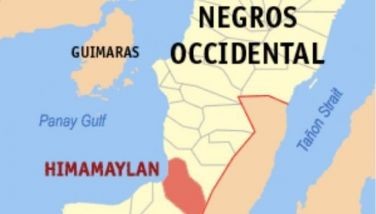‘No jueteng revival in Central Luzon’
March 17, 2006 | 12:00am
CAMP OLIVAS, Pampanga — Central Luzon police director Chief Superintendent Alejandro Lapinid denied allegations that jueteng has made a comeback in his turf, saying a legal small town lottery similar to the illegal numbers game is being experimented on by the Philippine Charity Sweepstakes Office (PCSO) in Angeles City and Bataan.
"The reports I get regularly from police field officers indicate that jueteng has not returned to Central Luzon," Lapinid said.
He added, though, that there have been reported cases of some people tricking others to cast bets although no draws are ever held, Lapinid told The STAR.
He said the experimental lottery in Angeles City and Bataan could have been mistaken by some people for jueteng.
Earlier, Dagupan Archbishop Oscar Cruz claimed that jueteng has made a comeback in many parts of Luzon.
Lapinid disclosed that the PCSO wrote him last week seeking police support for a small town lottery to be carried out on "test-run basis" in Luzon.
He said the letter specifically cited Bataan, Angeles City and Lucena City as the test areas of the lottery.
According to the PCSO, the lottery was meant "to provide (a) legitimate source of livelihood" for the unemployed.
Sources in Angeles City claimed that people with so-called papelitos with PCSO markings have, indeed, been soliciting bets in their respective areas.
Jueteng bet collectors are known to use papelitos, or narrow strips of paper where they record number combinations which locals are betting on.
The sources, however, said the experimental lottery is apparently being used as front for jueteng, claiming that bets are drawn three times a day in Barangay Pandan in Angeles City.
Lapinid said the PCSO identified the lottery operator in Angeles City as the Lake Tahoe Gaming and Amusement Corp.
The PCSO further said it considered six private corporations, including Lake Tahoe, for the new experimental lottery.
Lapinid said the letter was signed by PCSO chief Rosario Oriarte whom he quoted as saying that final plans for the full implementation of the lottery were still being drawn up and would be ready by August after consultations with "officials."
"I don’t think that police station commanders would allow the revival of jueteng in their areas since the one-strike policy still stands. They won’t allow themselves to be relieved from their posts," he said.
Some Central Luzon officials have advocated the legalization of jueteng amid the thousands of people displaced by the crackdown on the popular illegal numbers game last year.
Lapinid said majority of those displaced have remained jobless and have apparently been pushed to commit crimes. Crimes against property in the region have risen by as much as 50 percent.
While many local officials have apparently tried to provide alternative livelihood to the displaced jueteng workers, Lapinid said local resources have been inadequate.
However, he cited the case of Candaba, Pampanga as an exception, saying that the town’s mayor, Jerry Pelayo, has been successful in providing local jueteng workers with alternative livelihood.
The Department of Social Welfare and Development offered a P5,000 livelihood assistance to the most adversely affected jueteng workers, but Lapinid said, "It seems that many beneficiaries did not invest the amount in livelihood projects."
Lapinid said crimes against property rose by 30 to as much as 50 percent in Central Luzon since jueteng was stopped when he assumed the post as regional police director in August last year.
"But the cases involved petty crimes, such as cellphone snatching," he said.
Earlier, the Philippine Drug Enforcement Agency in Central Luzon noted an increase in drug-related cases since the jueteng crackdown.
"The reports I get regularly from police field officers indicate that jueteng has not returned to Central Luzon," Lapinid said.
He added, though, that there have been reported cases of some people tricking others to cast bets although no draws are ever held, Lapinid told The STAR.
He said the experimental lottery in Angeles City and Bataan could have been mistaken by some people for jueteng.
Earlier, Dagupan Archbishop Oscar Cruz claimed that jueteng has made a comeback in many parts of Luzon.
Lapinid disclosed that the PCSO wrote him last week seeking police support for a small town lottery to be carried out on "test-run basis" in Luzon.
He said the letter specifically cited Bataan, Angeles City and Lucena City as the test areas of the lottery.
According to the PCSO, the lottery was meant "to provide (a) legitimate source of livelihood" for the unemployed.
Sources in Angeles City claimed that people with so-called papelitos with PCSO markings have, indeed, been soliciting bets in their respective areas.
Jueteng bet collectors are known to use papelitos, or narrow strips of paper where they record number combinations which locals are betting on.
The sources, however, said the experimental lottery is apparently being used as front for jueteng, claiming that bets are drawn three times a day in Barangay Pandan in Angeles City.
Lapinid said the PCSO identified the lottery operator in Angeles City as the Lake Tahoe Gaming and Amusement Corp.
The PCSO further said it considered six private corporations, including Lake Tahoe, for the new experimental lottery.
Lapinid said the letter was signed by PCSO chief Rosario Oriarte whom he quoted as saying that final plans for the full implementation of the lottery were still being drawn up and would be ready by August after consultations with "officials."
"I don’t think that police station commanders would allow the revival of jueteng in their areas since the one-strike policy still stands. They won’t allow themselves to be relieved from their posts," he said.
Some Central Luzon officials have advocated the legalization of jueteng amid the thousands of people displaced by the crackdown on the popular illegal numbers game last year.
Lapinid said majority of those displaced have remained jobless and have apparently been pushed to commit crimes. Crimes against property in the region have risen by as much as 50 percent.
While many local officials have apparently tried to provide alternative livelihood to the displaced jueteng workers, Lapinid said local resources have been inadequate.
However, he cited the case of Candaba, Pampanga as an exception, saying that the town’s mayor, Jerry Pelayo, has been successful in providing local jueteng workers with alternative livelihood.
The Department of Social Welfare and Development offered a P5,000 livelihood assistance to the most adversely affected jueteng workers, but Lapinid said, "It seems that many beneficiaries did not invest the amount in livelihood projects."
Lapinid said crimes against property rose by 30 to as much as 50 percent in Central Luzon since jueteng was stopped when he assumed the post as regional police director in August last year.
"But the cases involved petty crimes, such as cellphone snatching," he said.
Earlier, the Philippine Drug Enforcement Agency in Central Luzon noted an increase in drug-related cases since the jueteng crackdown.
BrandSpace Articles
<
>
- Latest
- Trending
Trending
Latest



























